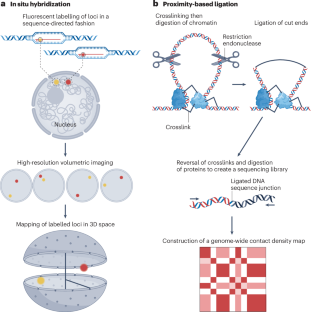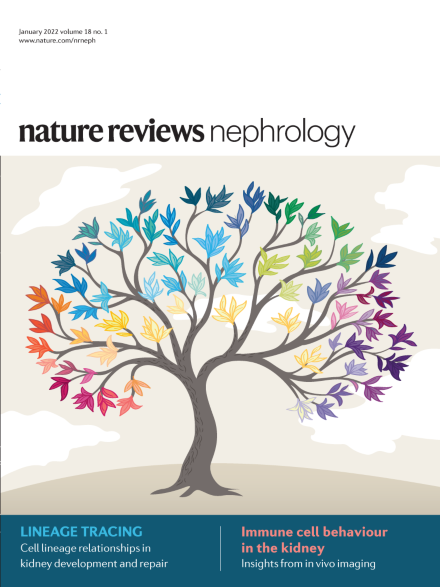肾脏三维基因组结构和动态研究指南
IF 39.8
1区 医学
Q1 UROLOGY & NEPHROLOGY
引用次数: 0
摘要
人类基因组紧紧包裹在细胞核的三维环境中。绘制三维基因组结构图的方法日新月异、日臻成熟,揭示了基因组组织和基因调控的基本原理。从单个基因到整个染色体,基因组在不同尺度上进行物理组织。核膜和核小体等核标志物在划分核内基因组方面发挥着重要作用。基因组的活动(如基因转录)也在这种三维组织中进行功能分区。基因组的三维结构不是静态的,而是在不同时间尺度上受到严格调控。基因组结构随时间的动态变化代表了基因组的第四个维度。创新方法已被用于绘制重要细胞过程(包括生物体发育、对刺激的反应、细胞分裂和衰老)中基因组结构的动态调控图。此外,4D 基因组的破坏还与包括肾脏在内的各种疾病有关。随着研究 4D 基因组的工具和方法越来越容易获得,未来应用这些方法研究肾脏生物学的研究将有助于深入了解肾脏在健康和疾病中的功能。本文章由计算机程序翻译,如有差异,请以英文原文为准。


A guide to studying 3D genome structure and dynamics in the kidney
The human genome is tightly packed into the 3D environment of the cell nucleus. Rapidly evolving and sophisticated methods of mapping 3D genome architecture have shed light on fundamental principles of genome organization and gene regulation. The genome is physically organized on different scales, from individual genes to entire chromosomes. Nuclear landmarks such as the nuclear envelope and nucleoli have important roles in compartmentalizing the genome within the nucleus. Genome activity (for example, gene transcription) is also functionally partitioned within this 3D organization. Rather than being static, the 3D organization of the genome is tightly regulated over various time scales. These dynamic changes in genome structure over time represent the fourth dimension of the genome. Innovative methods have been used to map the dynamic regulation of genome structure during important cellular processes including organism development, responses to stimuli, cell division and senescence. Furthermore, disruptions to the 4D genome have been linked to various diseases, including of the kidney. As tools and approaches to studying the 4D genome become more readily available, future studies that apply these methods to study kidney biology will provide insights into kidney function in health and disease. Here, the authors describe approaches to investigating 3D genome architecture and dynamics. They discuss the physical organization and dynamic regulation of the genome and highlight studies that have provided insights into the roles of genome structure and regulation in kidney health and disease.
求助全文
通过发布文献求助,成功后即可免费获取论文全文。
去求助
来源期刊

Nature Reviews Nephrology
医学-泌尿学与肾脏学
CiteScore
39.00
自引率
1.20%
发文量
127
审稿时长
6-12 weeks
期刊介绍:
Nature Reviews Nephrology aims to be the premier source of reviews and commentaries for the scientific communities it serves.
It strives to publish authoritative, accessible articles.
Articles are enhanced with clearly understandable figures, tables, and other display items.
Nature Reviews Nephrology publishes Research Highlights, News & Views, Comments, Reviews, Perspectives, and Consensus Statements.
The content is relevant to nephrologists and basic science researchers.
The broad scope of the journal ensures that the work reaches the widest possible audience.
 求助内容:
求助内容: 应助结果提醒方式:
应助结果提醒方式:


